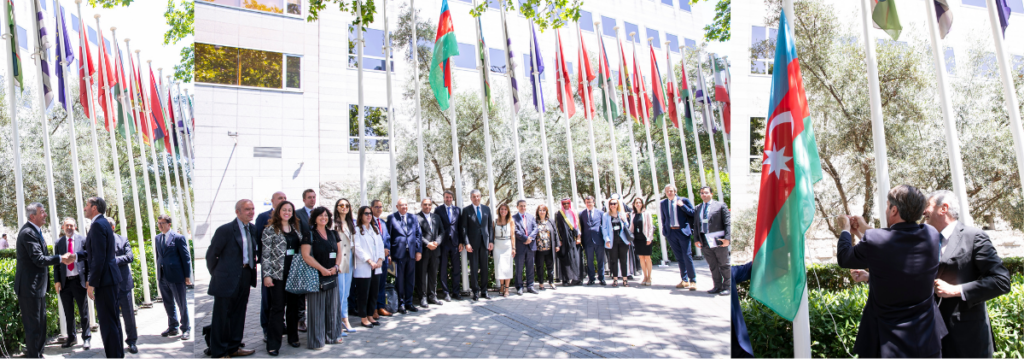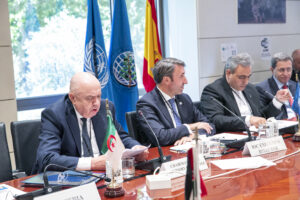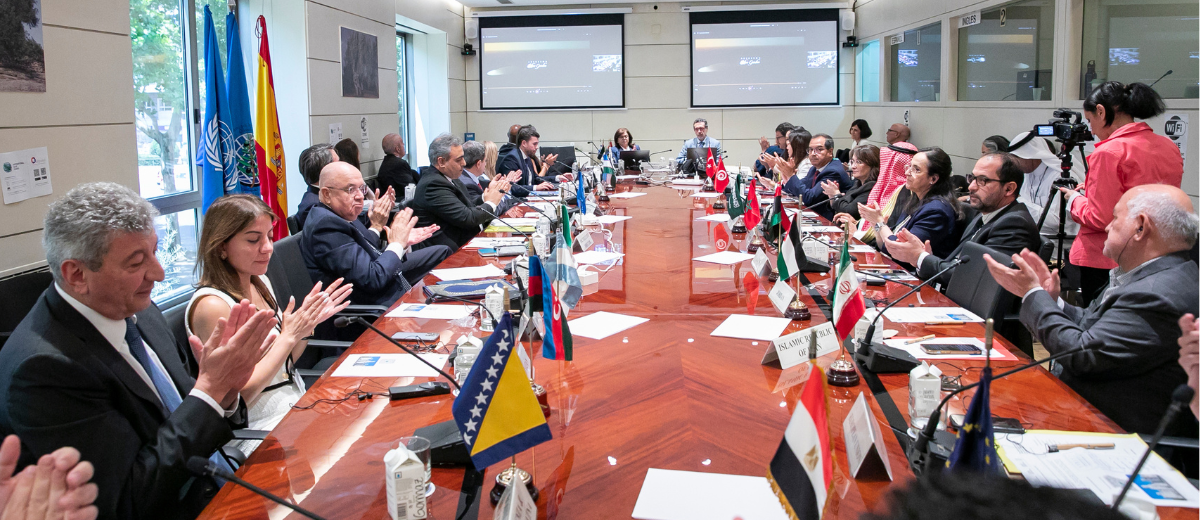Representatives of the IOC’s Member States gather to welcome new members and discuss updates for the year
The International Olive Council (IOC) convened the 119th plenary session of its Council of Members on Tuesday, June 25 at the headquarters in Madrid. It brought together delegations from most of the organization’s 20 Member States, who represent around 94% of the world’s producing countries of olive oil and table olives.
The representatives and the IOC’s Executive Secretariat met to welcome the countries that have most recently acceded to the International Agreement on Olive Oil and Table Olives, 2015, namely the Republic of Azerbaijan and Bosnia and Herzegovina. They also welcomed the Republic of San Marino’s participation as an observer following their official request to join the IOC. Among the topics of discussion at the plenary were also the IOC’s progress in 2024, upcoming projects, as well as current challenges and opportunities for the global olive sector. Climate change, which poses a particular hurdle for the olive sector, is being addressed by the IOC through a variety of actions, including knowledge transfer activities, expert missions, the “Dialogues for the Future” initiative, inter alia, falling under the IOC’s motto “Olive oil is good for your health and for the planet”. The assembly concluded with the flag rising ceremony to honor the Republic of Azerbaijan’s adherence to the Agreement and the country’s incorporation to the IOC family.

The session counted on the online presence of the Minister for Agriculture of Jordan and on a pre-recorded video from the Spanish Minister for Agriculture. The IOC welcomed the in-person participation of the Ambassadors to Spain of Argelia, Argentina, Azerbaijan, Egypt, Jordan, Libya, Tunisia and Uruguay, and other key authorities, including the Chair of the Council of Members, currently held by Iran, and the Chair of the Advisory Committee, now held by Tunisia. Also present were Heads of Delegation from the European Commission, Türkiye, Saudi Arabia, Morocco, Iran and Uzbekistan, and representatives from observer members, including the United States of America (USA), Brazil, the Arab League and San Marino. Among the attendees were also the newly appointed IOC Deputy Executive Directors from Tunisia and Türkiye, who will both assume their posts on July 1.
In his video, Spain’s Minister for Agriculture, Fisheries and Food Luis Planas recalled that climate change is one of humanity’s most significant challenges, and that “to cope with water shortages or the appearance of possible pests and diseases, we need to focus on innovation”. He underlined the relevance of the recent agreement between the IOC, the Spanish Government and the FAO to include the international olive germplasm bank in Cordoba under the International Treaty on Plant Genetic Resources for Food and Agriculture (ITPGRFA). “Multilateralism and international coordination are fundamental,” he said. “We need coordinated, precise responses. That’s why the IOC’s role is strategic.”
The Minister of Agriculture of the Hashemite Kingdom of Jordan, Khaled Musa Al Henefat, who held the IOC chairmanship for two years until December 31, 2023, participated online from Amman, stressing the importance of IOC member countries working together to address vital issues for the olive oil sector, and encouraging the organization of promotional campaigns to spread the health benefits of olive oil across the board.
 Jaime Lillo, IOC Executive Director, welcomed the participation of the IOC’s member countries, emphasizing that their contribution reflected the importance and involvement of these countries with the Organization and the olive sector as a whole.
Jaime Lillo, IOC Executive Director, welcomed the participation of the IOC’s member countries, emphasizing that their contribution reflected the importance and involvement of these countries with the Organization and the olive sector as a whole.
On the occasion of the 119th plenary session, a number of decisions affecting almost all of the IOC’s operational units were presented by the specialized committees and adopted by the Council, including decisions to revise the method for the organoleptic assessment of virgin olive oil, the IOC Trade Standard applying to olive oils and olive-pomace oils, and Memorandums of Understanding with a number of institutions, such as the Spanish National Research Council or the UC Davis Olive Center. Moreover, the Council said its farewell to Mustafa Sepetçi, IOC DED for administrative affairs whose term in office concludes on June 30 after eight years working for the organization’s Secretariat.
The 119th session, followed by key sector events like the Mario Solinas Quality Awards ceremony for the quality of northern hemisphere extra virgin olive oils (June 25) or the Olive Oil World Congress (June 26-28), sets the course of action for the IOC, laying down the action plan for the next semester.










